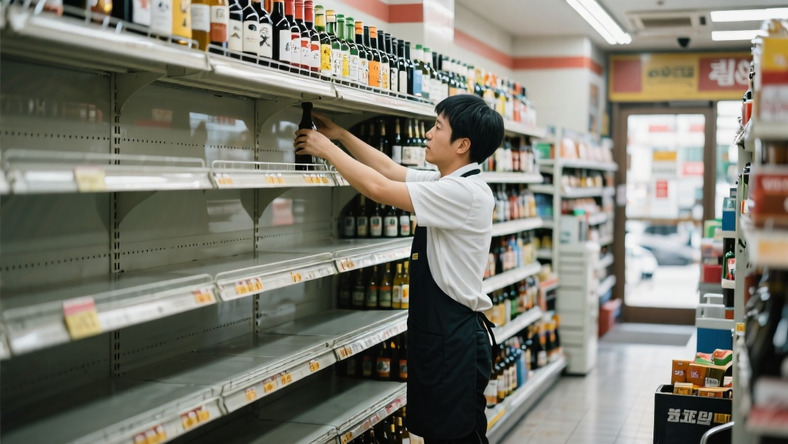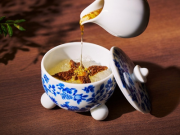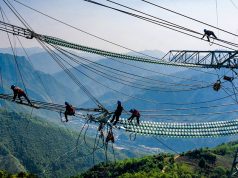( SINGAPORE, 15.07.2025 Nearly 60 days have passed since the Chinese government announced the “strictest-ever rule” prohibiting public expenditure on alcohol, the business sector most negatively affected are not the producers of baijiu (白酒, literally white liquor) but the millions of road-side tobacco and liquor shops found all over China, many of which have as a result closed down or need to transform their sales model to avoid winding up, the Chinese media reported.
Following Beijing’s promulgation of the “Regulations on Stringent Economising and Combating Wastes by Party and Government Agencies” in May, which contain, among other things, a comprehensive and strict ban on public spending on alcohol, many of China’s tobacco and liquor shops are experiencing falling business and may eventually wind up, reported 36 Kr, a Chinese media focused on technology and entrepreneurship.

The regulations institutionalized the idea of frugality and elimination of wastes as official, enforceable rules following strong public criticisms that government and ruling party agencies indulge in improper practices such as using public funds for lavish banquets, using official vehicles for personal purposes, and taking trips at public expense. Banning of public spending on alcohol, including baijiu, is one prominent clause in the regulations.
Almost a fixture at corporate and government functions, baijiu is a traditional Chinese distilled spirit widely consumed in the country.
However, having weathered several rounds of alcohol restrictions, the most recent being the one in 2012, baijiu producers in China are already used to relying less on government and corporate consumptions for business. While the latest ban does have an impact, it is not enough to crash the industry. In fact, since the announcement, the Baijiu Index, which reflects the overall performance and trends of China’s baijiu sector, has remained stable rather than plunging, noted 36 Kr.
The hardest hit are instead the tobacco and liquor stores. According to a report by baijiu-focused media outlet “Huijiu,” in April baijiu sales in tobacco and liquor stores dropped by 80% year-over-year in some provinces and cities.
The reason of their crisis is that the ban has derailed their business model. Tobacco and liquor stores are essentially business-to-business (B2B) enterprises but they present themselves as business-to-customers (B2C) operation.
Therefore, tobacco and liquor stores in China depend on bulk orders from government and corporate clients to thrive. Prior to the ban, group purchases by private companies accounted for 30% of their business while those from state-owned enterprises (SOEs) and public institutions about 50%. Only the remaining 20% came from retail.
Now, with the new ban mandating a complete prohibition on alcohol at government work-related meals, procurement demand from SOEs and public institutions has all but vanished, thoroughly destroying their business foundation, remarked 36 Kr.
China opened up the government monopoly of alcohol sale in 1998, giving rise to the first wave of tobacco and liquor shops. They became the key sales channels and rode the industry’s cycles. When baijiu rose in status to become a premium alcohol, the number of tobacco and liquor stores across China expanded significantly. Compared with their low point in 2015, their number grew by about 2.5 times to 5.6 million by 2019.
During baijiu’s declining phase from 2021 to 2024, with sluggish sales, inventory pile-ups, and inverted pricing during the Covid lockdown, business of tobacco and liquor stores deteriorated rapidly. From 2021 to 2024, their average revenue fell by 40%.
According to the China Alcoholic Drinks Association, the number of these shops is projected to fall by 17% to 22% this year. Just as things are already difficult, the new alcohol ban struck, sending the industry into “acute shock.”
According to “Huijiu,” within one month of the ban, over 90% of tobacco and liquor stores saw sales decline, with year-over-year drops of 80% in some areas. Even in Jiangsu and Zhejiang, two of China’s wealthiest provinces, sales plummeted. Jiangsu’s tobacco and liquor sales fell around 45%, and Zhejiang’s 40%.
Compared to previous bans, this one is broader in scope as it applies to also central state-owned enterprises (SOEs) for the first time, is stricter in enforcement as it aims not just at luxury liquors but the full range of alcohols, and comes harsher in accountability with lax superiors now facing joint liability.
Under this pressure, some local governments have escalated prevention measures, even banning alcohol at private gatherings of public officials.
Despite the unprecedented severity, the damage to tobacco and liquor stores far outweighs the impact on the baijiu manufacturing industry. According to data from Huace Consulting, in the first month of the policy, the revenue of Shandong’s baijiu industry dropped by 18.7%, far better than the 40% to 80% fall among tobacco and liquor stores.
Most demands for premium baijiu come from government and corporate sectors, which do not deal directly with distilleries but through the intermediary tobacco and liquor shops. These stores offer product varieties and, more importantly, the ability to navigate the “complexities” of China’s procurement landscape.
Although the overall market for tobacco and liquor stores has shrunk significantly, survival prospects still vary by store type. Only those shops highly dependent on government and business relations are facing extinction.
Hence, many must shift from traditional dependence to market-based competition. Many are already making moves to secure market share. For example, they have begun to transform by integrating with local lifestyle platforms such as Meituan and Ele.me and developing instant delivery services. Many are pivoting to on-demand retail by opening storefronts on online shopping platforms such as JD.com and Taobao. In addition, many explore the gift strategy, using gift cards as a way to attract customers and boost sales.
Despite these efforts, challenges remain. In fact, their biggest market competitors are large retail chains, which have scale advantages and can offer lower prices and more varieties. Convenience stores, with prime locations and 24-hour service, also pose stiff competition.
As a core distribution agent in the liquor industry, tobacco and alcohol shops in China would not disappear entirely. But in a shrinking market, many of them are fated to undergo radical transformations – or quit altogether, concluded 36 Kr.





































